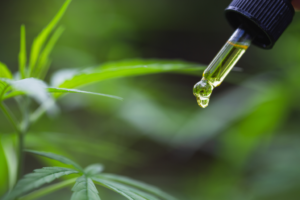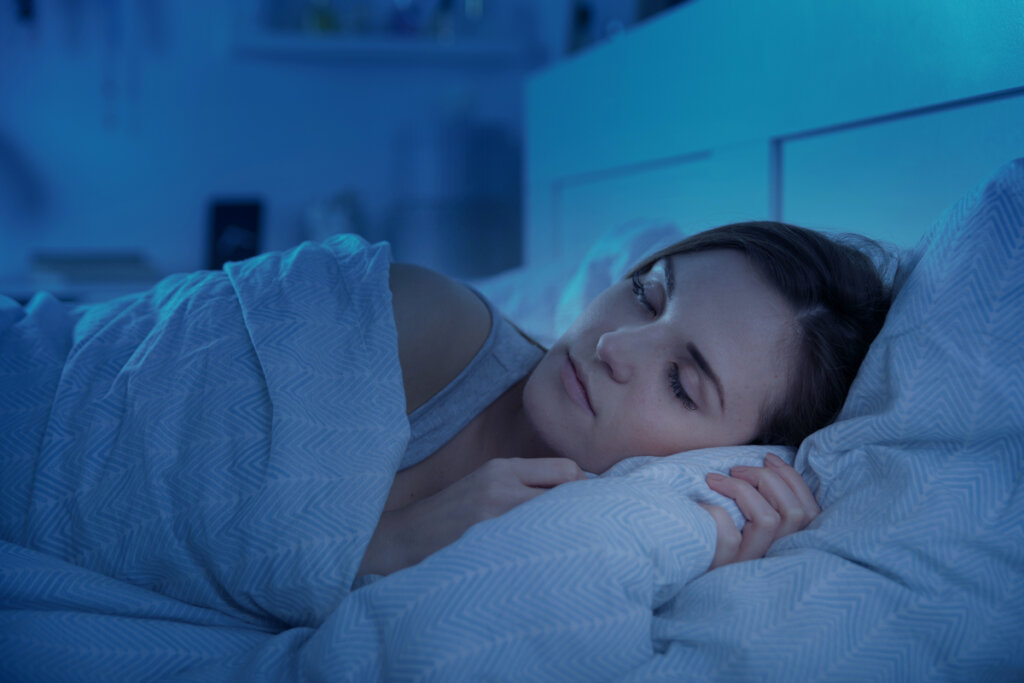Does CBD Really Improve Sleep?

CBD is a fashionable substance. It’s a neurotransmitter that’s extracted from hemp oil from the cannabis plant. It has therapeutic and beneficial properties for health. In fact, it’s especially useful in treating insomnia and anxiety. Furthermore, it’s a natural product with a high safety profile.
The first thing we must make clear is that, despite its origin, there’s no evidence that CBD is harmful to health. As a matter of fact, the element in the cannabis plant that causes psychotropic effects and increases the risk of developing epilepsy is THC. However, CBD products either lack or have a negligible dose of this toxic substance.
CBD and sleep quality
The quality of sleep is conditioned, among other factors, by the production of melatonin. In recent years, experts have promoted the use of supplements of this substance for achieving a more restful and higher quality rest. However, CBD is a compound that could prove useful for the same purpose, according to a study published in the journal, Frontiers in Immunology.
Not only does CBD have this property, but it also contains an antioxidant. In addition, it has a neuroprotective effect, and could even be beneficial for the body’s recovery after high-intensity physical effort. The latter is currently being investigated. Furthermore, CBD is considered to be a natural anxiolytic. Indeed, a study suggests that it could be used to prevent episodes of depression or anxiety.

CBD oil
CBD can be found on the market in different forms. The most common is oil. However, although its labeling suggests a topical use, most people consume a few drops of the compound in order to achieve better results. In fact, the most positive effects are obtained from intake. Nevertheless, it can’t be used in this manner in all countries due to current rules and regulations.
There are different types of CBD oil on the market. The most efficient of all of them is classified as full spectrum. It’s characterized by containing, without exception, cannabinoids from the plant, although in variable amounts. In this oil, THC is also present but only represents less than 0.01 percent of the total. This is an insufficient concentration to generate any disease in the body.
On the other hand, it’s also possible to purchase a CBD product without THC. However, in this case, its effects would be drastically reduced. Indeed, it’s necessary that all the neurotransmitters are present in the oil for the so-called entourage effect to occur. This means enhanced results.
What must be taken into account when choosing CBD oil?
The CBD oil market is growing. As we’ve already mentioned, the product can improve both the quality of rest and mental health. However, it’s advisable to choose one that has the appropriate certification of good production practices. In addition, it’s important that it comes from organic hemp oil, without additives.
The different concentrations of CBD that the oils contain should also be taken into account. For instance, it’s best to start with one of five or ten percent. Then, if necessary, the dosage can be increased until the point of optimal well-being is reached.

A revolutionary compound
As you can see, CBD presents the beneficial properties of the cannabis plant without the damaging effects of taking it in the more traditional way. In addition to oil format, the compound can be found in other forms of presentation. In fact, it’s currently marketed in many pharmacies as lozenges. These also tend to contain melatonin.
However, you must remember that in order to get a good night’s good rest you should start with other healthy habits. For example, taking regular exercise, going to bed early, and avoiding the use of mobile devices just before bed. In this way, the endogenous synthesis of melatonin, a crucial hormone in the regulation of your sleep and wake cycles, won’t be impaired.
CBD is a fashionable substance. It’s a neurotransmitter that’s extracted from hemp oil from the cannabis plant. It has therapeutic and beneficial properties for health. In fact, it’s especially useful in treating insomnia and anxiety. Furthermore, it’s a natural product with a high safety profile.
The first thing we must make clear is that, despite its origin, there’s no evidence that CBD is harmful to health. As a matter of fact, the element in the cannabis plant that causes psychotropic effects and increases the risk of developing epilepsy is THC. However, CBD products either lack or have a negligible dose of this toxic substance.
CBD and sleep quality
The quality of sleep is conditioned, among other factors, by the production of melatonin. In recent years, experts have promoted the use of supplements of this substance for achieving a more restful and higher quality rest. However, CBD is a compound that could prove useful for the same purpose, according to a study published in the journal, Frontiers in Immunology.
Not only does CBD have this property, but it also contains an antioxidant. In addition, it has a neuroprotective effect, and could even be beneficial for the body’s recovery after high-intensity physical effort. The latter is currently being investigated. Furthermore, CBD is considered to be a natural anxiolytic. Indeed, a study suggests that it could be used to prevent episodes of depression or anxiety.

CBD oil
CBD can be found on the market in different forms. The most common is oil. However, although its labeling suggests a topical use, most people consume a few drops of the compound in order to achieve better results. In fact, the most positive effects are obtained from intake. Nevertheless, it can’t be used in this manner in all countries due to current rules and regulations.
There are different types of CBD oil on the market. The most efficient of all of them is classified as full spectrum. It’s characterized by containing, without exception, cannabinoids from the plant, although in variable amounts. In this oil, THC is also present but only represents less than 0.01 percent of the total. This is an insufficient concentration to generate any disease in the body.
On the other hand, it’s also possible to purchase a CBD product without THC. However, in this case, its effects would be drastically reduced. Indeed, it’s necessary that all the neurotransmitters are present in the oil for the so-called entourage effect to occur. This means enhanced results.
What must be taken into account when choosing CBD oil?
The CBD oil market is growing. As we’ve already mentioned, the product can improve both the quality of rest and mental health. However, it’s advisable to choose one that has the appropriate certification of good production practices. In addition, it’s important that it comes from organic hemp oil, without additives.
The different concentrations of CBD that the oils contain should also be taken into account. For instance, it’s best to start with one of five or ten percent. Then, if necessary, the dosage can be increased until the point of optimal well-being is reached.

A revolutionary compound
As you can see, CBD presents the beneficial properties of the cannabis plant without the damaging effects of taking it in the more traditional way. In addition to oil format, the compound can be found in other forms of presentation. In fact, it’s currently marketed in many pharmacies as lozenges. These also tend to contain melatonin.
However, you must remember that in order to get a good night’s good rest you should start with other healthy habits. For example, taking regular exercise, going to bed early, and avoiding the use of mobile devices just before bed. In this way, the endogenous synthesis of melatonin, a crucial hormone in the regulation of your sleep and wake cycles, won’t be impaired.
All cited sources were thoroughly reviewed by our team to ensure their quality, reliability, currency, and validity. The bibliography of this article was considered reliable and of academic or scientific accuracy.
- Crippa, J. A., Guimarães, F. S., Campos, A. C., & Zuardi, A. W. (2018). Translational Investigation of the Therapeutic Potential of Cannabidiol (CBD): Toward a New Age. Frontiers in immunology, 9, 2009. https://doi.org/10.3389/fimmu.2018.02009
- Shannon, S., Lewis, N., Lee, H., & Hughes, S. (2019). Cannabidiol in Anxiety and Sleep: A Large Case Series. The Permanente journal, 23, 18–041. https://doi.org/10.7812/TPP/18-041
This text is provided for informational purposes only and does not replace consultation with a professional. If in doubt, consult your specialist.







